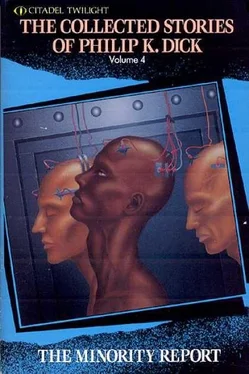The unreconstructed M was approaching them slowly, one receptor stalk extended. Again it halted, swiveled to the left until it was facing the workbench. It was not now in the shape of a portable TV unit; it had retaken its cracker-box shape.
"The plate," Ellen Ackers whispered. "It responded to the plate."
The M had been roused by Heimie Rosenburg's looking for it. But Beam still felt the presence of David Lantano. The big man was still here in the room; the sense of heaviness, the proximity of weight and ponderousness had arrived with the machine, as it moved, sketching Lantano's existence. As he fixedly watched, the machine produced a fragment of cloth fabric and pressed it into a nearby heap of grid-mesh. Other elements, blood and tobacco and hair, were being produced, but they were too small for him to see. The machine pressed a heel mark into the dust of the floor and then projected a nozzle from its anterior section.
Her arm over her eyes, Ellen Ackers ran away. But the machine was not interested in her; revolving in the direction of the workbench it raised itself and fired. An explosive pellet, released by the nozzle, traveled across the workbench and entered the debris heaped across the bench. The pellet detonated; bits of wire and nails showered in particles.
Heimie's dead, Beam thought, and went on watching. The machine was searching for the plate, trying to locate and destroy the synthetic neural emission. It swiveled, lowered its nozzle hesitantly, and then fired again. Behind the workbench, the wall burst and settled into itself.
Beam, holding the cigarette lighter, walked toward the M. A receptor stalk waved toward him and the machine retreated. Its lines wavered, flowed, and then painfully reformed. For an interval, the device struggled with itself; then, reluctantly, the portable TV unit again became visible. From the machine a high-pitched whine emerged, an anguished squeal. Conflicting stimuli were present; the machine was unable to make a decision.
The machine was developing a situation neurosis and the ambivalence of its response was destroying it. In a way its anguish had a human quality, but he could not feel sorry for it. It was a mechanical contraption trying to assume a posture of disguise and attack at the same time; the breakdown was one of relays and tubes, not of a living brain. And it had been a living brain into which it had fired its original pellet. Heimie Rosenburg was dead, and there were no more like him and no possibility that more could be assembled. He went over to the machine and nudged it onto its back with his foot.
The machine whirred snake-like and spun away. "Ugh, damn it!" it said. It showered bits of tobacco as it rolled off; drops of blood and flakes of blue enamel fell from it as it disappeared into the corridor. Beam could hear it moving about, bumping into the walls like a blind, damaged organism. After a moment he followed after it.
In the corridor, the machine was traveling in a slow circle. It was erecting around itself a wall of particles: cloth and hairs and burnt matches and bits of tobacco, the mass cemented together with blood.
"Ugh, damn it," the machine said in its heavy masculine voice. It went on working, and Beam returned to the other room.
"Where's a phone?" he said to Ellen Ackers.
She stared at him vacantly.
"It won't hurt you," he said. He felt dull and worn-out. "It's in a closed cycle. It'll go on until it runs down."
"It went crazy," she said. She shuddered.
"No," he said. "Regression. It's trying to hide."
From the corridor the machine said, "Ugh. Damn it." Beam found the phone and called Edward Ackers.
Banishment for Paul Tirol meant first a procession of bands of darkness and then a protracted, infuriating interval in which empty matter drifted randomly around him, arranging itself into first one pattern and then another.
The period between the time Ellen Ackers attacked him and the time banishment sentence had been pronounced was vague and dim in his mind. Like the present shadows, it was hard to pin down.
He had – he thought – awakened in Ackers' apartment. Yes, that was it; and Leroy Beam was there, too. A sort of transcendental Leroy Beam who hovered robustly around, arranging everybody in configurations of his choice. A doctor had come. And finally Edward Ackers had shown up to face his wife and the situation.
Bandaged, and on his way into Interior, he had caught a glimpse of a man going out. The ponderous, bulbous shape of David Lantano, on his way home to his luxurious stone mansion and acre of grass.
At sight of him Tirol had felt a goad of fear. Lantano hadn't even noticed him; an acutely thoughtful expression on his face, Lantano padded into a waiting car and departed.
"You have one thousand dollars," Edward Ackers was saying wearily, during the final phase. Distorted, Ackers' face bloomed again in the drifting shadows around Tirol, an image of the man's last appearance. Ackers, too, was ruined, but in a different way. "The law supplies you with one thousand dollars to meet your immediate needs, also you'll find a pocket dictionary of representative out-system dialects."
Ionization itself was painless. He had no memory of it; only a blank space darker than the blurred images on either side.
"You hate me," he had declared accusingly, his last words to Ackers. "I destroyed you. But… it wasn't you." He had been confused. "Lantano. Maneuvered but not. How? You did…"
But Lantano had had nothing to do with it. Lantano had shambled off home, a withdrawn spectator throughout. The hell with Lantano. The hell with Ackers and Leroy Beam and – reluctantly – the hell with Mrs. Ellen Ackers.
"Wow," Tirol babbled, as his drifting body finally collected physical shape. "We had a lot of good times… didn't we, Ellen?"
And then a roaring hot field of sunlight was radiating down on him. Stupefied, he sat slumped over, limp and passive. Yellow, scalding sunlight… everywhere. Nothing but the dancing heat of it, blinding him, cowing him into submission.
He was sprawled in the middle of a yellow clay road. To his right was a baking, drying field of corn wilted in the midday heat. A pair of large, disreputable-looking birds wheeled silently overhead. A long way off was a line of blunted hills: ragged troughs and peaks that seemed nothing more than heaps of dust. At their base was a meager lump of man-made buildings.
At least he hoped they were man-made.
As he climbed shakily to his feet, a feeble noise drifted to his ears. Coming down the hot, dirty road was a car of some sort. Apprehensive and cautious, Tirol walked to meet it.
The driver was human, a thin, almost emaciated youth with pebbled black skin and a heavy mass of weed-colored hair. He wore a stained canvas shirt and overalls. A bent, unlit cigarette hung from his lower lip. The car was a combustion-driven model and had rolled out of the twentieth century; battered and twisted, it rattled to a halt as the driver critically inspected Tirol. From the car's radio yammered a torrent of tinny dance music.
"You a tax collector?" the driver asked.
"Certainly not," Tirol said, knowing the bucolic hostility toward tax collectors. But – he floundered. He couldn't confess that he was a banished criminal from Earth; that was an invitation to be massacred, usually in some picturesque way. "I'm an inspector," he announced, "Department of Health."
Satisfied, the driver nodded. "Lots of scuttly cutbeede, these days. You fellows got a spray, yet? Losing one crop after another."
Tirol gratefully climbed into the car. "I didn't realize the sun was so hot," he murmured.
"You've got an accent," the youth observed, starting up the engine. "Where you from?"
"Speech impediment," Tirol said cagily. "How long before we reach town?"
Читать дальше










